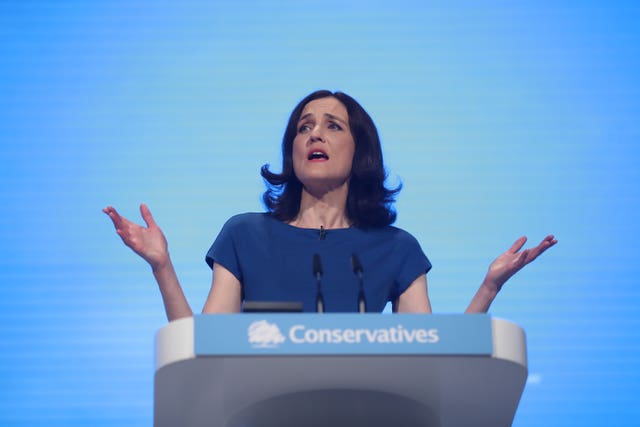Ministers resisted a Tory backbench attempt to give Parliament a definitive say on post-Brexit trade deals as flagship legislation cleared the Commons.
Concerns were raised that politicians in Westminster would be unable to prevent the Government reneging on commitments to protect the NHS and maintain animal welfare and food standards under the terms of the Trade Bill.
But the Government stressed UK law offers such protections and any changes would have to come before Parliament.
A Tory rebellion failed to gather momentum as an amendment moved by former minister Jonathan Djanogly, which sought to guarantee parliamentary approval of post-Brexit trade agreements, was rejected by 263 votes to 326 – majority 63.
For Labour, shadow international trade minister Bill Esterson said the lack of scrutiny threatens to leave the health service “wide open to pharmaceutical giants” and to “undermine” farmers and consumers.
He told the Commons: “Chemical washes of chicken, hormones in beef, ractopamine in pork and GM crops are banned in the UK – what’s wrong with keeping it that way?
“If the Government is saying we’re going to do it anyway, what’s the objection to putting it all in primary legislation?”
Mr Djanogly said his new clause four would have ensured the executive still negotiated free trade agreements (FTAs) but Parliament would have a “yes/no vote” on the negotiating objectives and the final draft agreement.
He said: “Not only has this not ended up in the Bill, but the Government’s position has seemingly reverted to having less scrutiny than we did as a member of the EU.
“For the last 40 years the EU has been negotiating our trade deals and as part of the EU scrutiny process, a yes/no vote would be taken by the EU Parliament on the draft FTA prior to signature.”

Neil Parish, Conservative chairman of the Environment, Food and Rural Affairs Committee, said it was “somewhat confusing” that ministers would not accept the amendment as the scrutiny would ensure they follow through on commitments to welfare standards.
Mr Djanogly agreed, adding: “As things stand, there is no longer a parliamentary veto and no formal scrutiny committee relationship yet established despite US negotiations having started.
“The important point of a parliamentary veto is not that it is often used – rather, as is seen in other parliaments, it encourages the executive to seek consensus on its negotiating mandate and keep legislators in touch during negotiations through regular discourse and discussion.
“A wise executive will naturally wish to avoid an unnecessary bust-up just before signing an FTA.”
Tory former environment secretary Theresa Villiers earlier called on the Government to confirm it will keep the import ban on chlorine-washed chicken.

Ms Villiers said she hoped the Government “will consider seriously whether changes can be made to strengthen parliamentary oversight” through amendments from MPs or in the House of Lords.
She told MPs: “All I’m asking is that we don’t sell ourselves short in this country. The UK is the third-biggest market for groceries in the world – even conditional access to that market is a valuable prize.
“Just because we would like a trade deal with the US doesn’t mean that we should give them everything they want. There is so much we can offer our trading partners in the US and other countries, and is it so unreasonable to say that when it comes to food, there are limits to liberalisation?”
But Tory former minister Steve Brine said: “Ultimately, won’t the consumer decide?
“Just recently we heard Waitrose make it very, very clear that they wouldn’t be selling any product that was imported to a lower standard than we currently enjoy in this country, and their new boss actually quoted chlorine-washed chicken. I just wonder whether the public might be ahead of us on this one already.”
Opening the debate, international trade minister Greg Hands said the Government was “committed to transparency” regarding scrutiny of international agreements.
He said: “International agreements themselves cannot alter domestic law and any changes to UK legislation would need to be scrutinised by Parliament in the normal way.
“We are strongly committed to transparency, as demonstrated by the steps we have taken to provide comprehensive information to the public and Parliament.”
MPs approved the Bill at third reading by 335 votes to 243, majority 92. It will undergo further scrutiny in the Lords at a later date.




Comments & Moderation
Readers’ comments: You are personally liable for the content of any comments you upload to this website, so please act responsibly. We do not pre-moderate or monitor readers’ comments appearing on our websites, but we do post-moderate in response to complaints we receive or otherwise when a potential problem comes to our attention. You can make a complaint by using the ‘report this post’ link . We may then apply our discretion under the user terms to amend or delete comments.
Post moderation is undertaken full-time 9am-6pm on weekdays, and on a part-time basis outwith those hours.
Read the rules hereLast Updated:
Report this comment Cancel